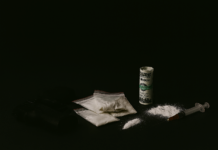By Yvonne Tahana, 1News Reporter
A man has been sentenced for his part in a massive 700kg liquid meth importation concealed in beer and kombucha bottles.

The man, who has permanent name suppression, will serve 22 years in prison with a minimum period of imprisonment of 10 years.
The case involved the largest importation of meth to make it across the New Zealand border and come before the courts.
The unnamed man’s co-accused Himatjit Kahlon was found guilty last year of the manslaughter of 21-year-old Aiden Sagala, who died after innocently drinking a Honey Bear-branded beer can which instead contained liquid methamphetamine.
Sagala was hospitalised after consuming a single drink – his health deteriorated and he died of multiple organ failure on March 7, with an “off the charts” level of meth in his system.
Kahlon knew the 21-year-old through work, and gave him the beer. His sentencing is later today.
But in the High Court at Auckland today the unnamed businessman, who did not face any charges over the death, sat with his head down for much of the sentencing.
He rented a Manukau warehouse in June 2021. Police raided that commercial property in 2023 and found 700 kgs of methamphetamine as well as 2kgs of cocaine. The meth was hidden in beer and kombucha bottles and was imported from India.
He pleaded guilty on the eve of his trial last year to four drugs charges related to ephedrine, methamphetamine and cocaine.
Justice Kiri Tahana asked lawyer Pip McNabb why the Crown did not think life imprisonment for the man with name suppression was appropriate given that it was New Zealand’s largest importation of methamphetamine.
McNabb said the Crown had thought about it carefully but concluded that there were higher people up the supply chain.
Justice Tahana also pressed Ron Mansfield KC, who is representing the man, on the issue of whether it was an aggravating feature of offending that the meth was hidden in food items, citing a number of meth lollies which were found in Auckland last year.
Mansfield said generally there was no risk to the general public as the meth was usually too valuable.
He said that his client was “recruited” and provided “the perfect front” for the importation. He was doing well in business and intelligent but was made to feel vulnerable because of a debt to another party.
Justice Tahana said that debt story was “implausible”.
She told the man his method of concealment was an aggravating feature of his offending, and she had considered a starting point of 32 years.
“Had it been distributed the consequences for the community would’ve been devastating. You were motivated by financial gains.”







